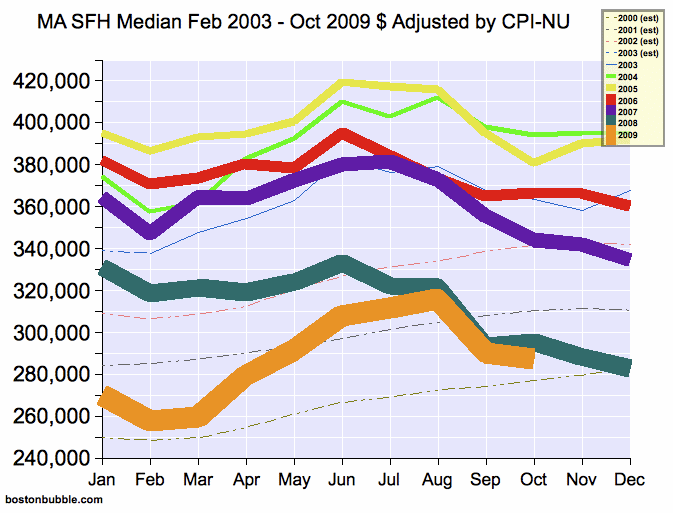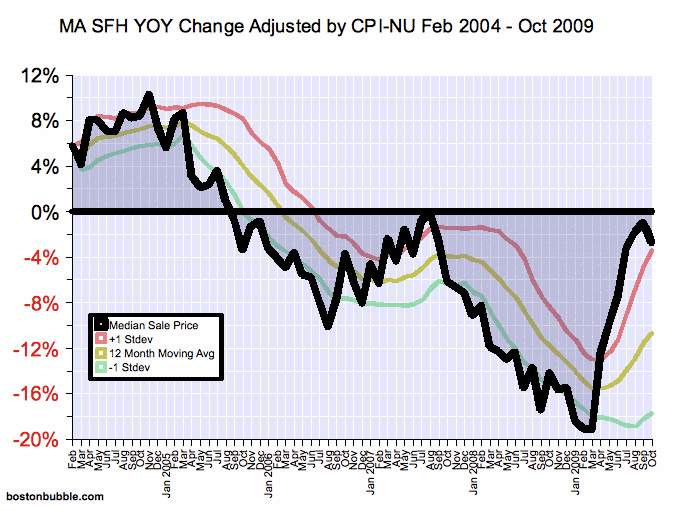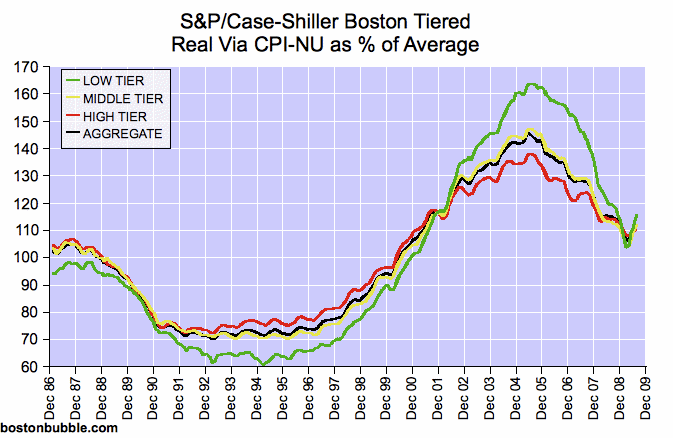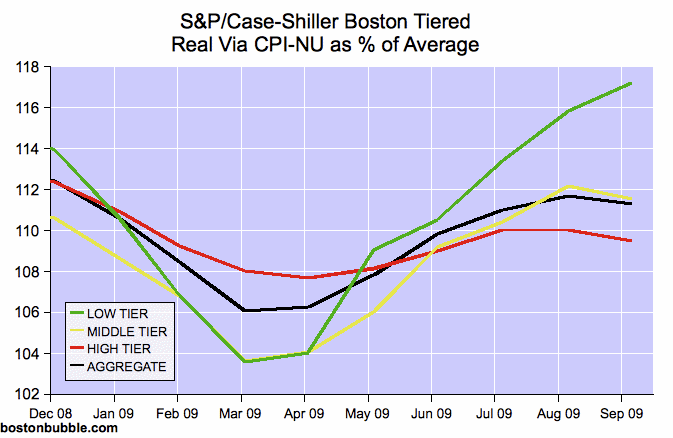 |
bostonbubble.com
Boston Bubble - Boston Real Estate Analysis
|
|
SPONSORED LINKS
Advertise on Boston Bubble
Buyer brokers and motivated
sellers, reach potential buyers.
www.bostonbubble.com
YOUR AD HERE
|
|
DISCLAIMER: The information provided on this website and in the
associated forums comes with ABSOLUTELY NO WARRANTY, expressed
or implied. You assume all risk for your own use of the information
provided as the accuracy of the information is in no way guaranteed.
As always, cross check information that you would deem useful against
multiple, reliable, independent resources. The opinions expressed
belong to the individual authors and not necessarily to other parties.
|
| View previous topic :: View next topic |
| Author |
Message |
admin
Site Admin
Joined: 14 Jul 2005
Posts: 1826
Location: Greater Boston
|
 Posted: Thu Nov 26, 2009 8:03 pm GMT Post subject: Boston Bubble Brief: The Real Story for MA - Oct 2009 Posted: Thu Nov 26, 2009 8:03 pm GMT Post subject: Boston Bubble Brief: The Real Story for MA - Oct 2009 |
 |
|
This is a brief report on what the data for the housing market in Massachusetts looks like in real terms. Market data is typically reported in nominal terms which can be misleading because it combines changes in housing values with changes in the value of the dollar. Correcting for inflation removes changes in the dollar as a factor and gives a more accurate picture of how housing values have changed. This report is based on the published data of the Massachusetts Association of Realtors, though it should be noted that the S&P/Case-Shiller Index is a superior data source.
The Massachusetts Association of Realtors released their data for October 2009 on Tuesday, November 24th. While the raw prices were provided in nominal terms, for this report they have been adjusted for inflation using the CPI Northeast Urban numbers available at http://www.bls.gov/cpi/ Adjusting for inflation produced the data represented by the graphs below. Prices for January 2003 and earlier have been estimated by applying the earliest reported median from The MAR, February 2003, against the S&P/Case-Shiller Index for the Boston area. Suggestions for improving this estimate are welcome.
Full Price History

Change in Median Price From One Year Earlier, February 2004 - October 2009
Seasonal variations are removed by comparing prices from the same month in the prior year.

Some observations:
- The real decline from October 2008 to October 2009 was 2.76%
- For the seventh month in a row, the year over year decline was above the normal range, with April being the first time since August 2007 that the decline has been one standard deviation or more above the moving average. This continues the abrupt departure from ever deepening declines which began in April and suggests that declines are moderating, albeit not necessarily due to sustainable influences.
- Real prices are once again lower than the same month in any other year in the time period covered by The MAR.
- Prices are now 31.54% below the peak set in June 2005. This is the result of a 23.21% decline in nominal housing prices and a 10.85% decline in the purchasing power of the dollar.
- The cumulative price decline from the beginning (Feb 2003) is 15.05%, which is an annualized decline of 2.42%.
- The price continued to fall below the estimate for the same month in 2001 after having briefly risen above it for three months in the summer.
At least two important factors led to the appearance of a larger than usual "bounce" this spring. Both factors were most likely temporary and consequently do not suggest that any apparent price "strength" or "stabilization" is sustainable. Furthermore, it is worth emphasizing that the apparent "strength" and "stabilization" are merely smaller than usual price declines - prices are still declining.
Probably the lesser of the two factors contributing to the "bounce" was a temporary bout of deflation. The year over year change in the CPI-NU was actually negative for six months spanning the spring and summer, making the real decline in housing prices smaller than what has been reported by the media. This effect was temporary, though, as the year over year decline in consumer prices is the result of a deflationary spike from last fall which has already run its course. The effect still showed up in the year over year numbers until October 2009, when year over year inflation returned to the usual, upward trend.
The more prominent factor has very likely been the temporary $8,000 US tax credit for home buyers which has likely distorted this year's spring and summer selling seasons. At the most basic level, it plausibly added $8,000 to the price of homes near the Massachusetts median. However, its side effects may have been just as important, if not more so, in producing the appearance of a particularly large spring bounce. The tax credit in conjunction with the Massachusetts program to facilitate its use as a down payment surely expanded the pool of potential buyers to people who would have otherwise not been able to buy due to an insufficient down payment. In fact, the increased demand from people rushing to not miss out on $8,000 in savings could very well have (artificially) bid prices up by quite a bid more than $8,000 because of all the extra buyers.
The tax credit also probably caused a time shift of home purchases which would have been made anyway, pulling demand from the beginning of 2009 as well as next year and swelling demand this spring, summer, and fall. Depressed demand in the winter would have lowered prices there and increased demand in the spring and summer would have increased prices there, and so the apparent rise from winter to summer is artificially steepened. Finally, those who purchased before the credit took affect may have mentally discounted their offer prices to make up for the credit they would be missing.
Strong evidence for this hypothesis can be seen in the tiered S&P/Case-Shiller Index for Boston. The bounce is very pronounced in the low tier, where the credit would have the most impact, and practically absent in the high tier, where it would be a smaller percentage of the price and where many buyers would have been presumably disqualified from the credit due to the associated income limits.


In fact, the Massachusetts Association of Realtors attributed the recent "improvement" in prices (i.e., declines that aren't as steep usual) and increase in sales volume to the home buyer tax credit:
| Quote: |
"We really feel that the past three months of positive home sales are a result of the $8,000 tax credit and its impending expiration date," said MAR President Gary Rogers, a broker with RE/MAX First Realty in Waltham. "Despite this bump, we are concerned that it will take longer and be more difficult for the market to stabilize without extending the Federal tax credit for homebuyers past the December 1 deadline."
|
In essence, recent data does not demonstrate stabilization, it does not demonstrate a bottom, it only reflects government life support. If the market had truly hit bottom, there would be no need for continued government intervention. (Which isn't to say that there is a "need" for it pre-bottom either, just that calls for help with "stabilization" are pointless if stabilization already exists.) While the begging of such industry groups did end up working to extend and expand the expensive and fraud riddled pork, it may produce diminishing returns once the year over year numbers no longer reflect increasing intervention and because many purchases have already been time shifted.
It will be extremely interesting to see how the extended and expanded tax credit impacts home prices in the Boston area. Continued price "stabilization" might require not just continued government intervention, but continually increasing levels of intervention. This most recent extension of the credit delivers in that regard in that it expands the credit to also be a handout to high income buyers and existing owners. However, the expansion to include existing owners could potentially end up lowering Boston area prices by encouraging current owners to take this as an $8K incentive to move to a lower cost area. It will be very interesting to see which dynamic prevails.
Additionally, it may only be a matter of time before the tax credit backfires in creating the sense of urgency which is essential to producing the illusion of demand. Remember, this incentive started as an interest free loan that eventually needed to be repaid. Then it was expanded to be a straight handout. Now it has been expanded once again to be a handout to the wealthy and existing homeowners. If the credit keeps being extended and expanded, that actually produces an additional incentive to wait to buy because the handout will be so much better later.
Another interesting questions is how many buyers have been tapped out already? Did the intermediate tax credit already time shift most marginal demand that could be stimulated into spring and summer 2009? The credit is a huge wild card and is stimulating uncertainty.
The S&P/Case-Shiller Index for Boston is likely superior to the data above as it corrects for many flaws that are inherent when using only the median price. The S&P/Case-Shiller Index also has the advantage that futures contracts can be traded against it, thereby offering an unbiased insight into where housing prices are expected to be in the future. It also has more extensive historical data available. The MAR data was used for this report mainly out of inertia and might be replaced with the S&P/Case-Shiller Index in future reports.
As usual, please do try this at home. Double checking of the math used to construct the above graphs and analysis is strongly encouraged in order to help ferret out any errors. The data was derived from the following sources:
The text of this post and the associated graphs are Copyright 2009 by bostonbubble.com with all rights reserved, except as stated here. You may reproduce each graph individually or the text of the entire post as a whole (including graphs) under the Creative Commons Attribution-No Derivative Works 3.0 Unported License. You may additionally scale the graphs to fit your work. Alternatively, if you remove the bostonbubble.com signature from the bottom left hand corner of the images within this post, those modified images (and only those modified images) can then be distributed under the Creative Commons Attribution 3.0 Unported License. In all cases, attribution should be made via a hyperlink to http://www.bostonbubble.com/forums/viewtopic.php?t=2415 or http://www.bostonbubble.com/ Quoting excerpts of the text is also allowed provided that the quotes would normally fall under fair use. To request other terms for reproduction, please post your request in the original thread at http://www.bostonbubble.com/forums/viewtopic.php?t=2415
The latest version of this report can be found at http://www.bostonbubble.com/latest.php?id=ma_inflation
- admin |
|
| Back to top |
|
 |
|
|
You can post new topics in this forum
You can reply to topics in this forum
You cannot edit your posts in this forum
You cannot delete your posts in this forum
You cannot vote in polls in this forum
|
Forum posts are owned by the original posters.
Forum boards are Copyright 2005 - present, bostonbubble.com.
Privacy policy in effect.
Powered by phpBB © 2001, 2005 phpBB Group
|






